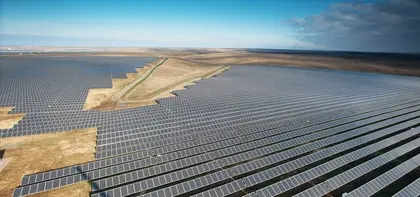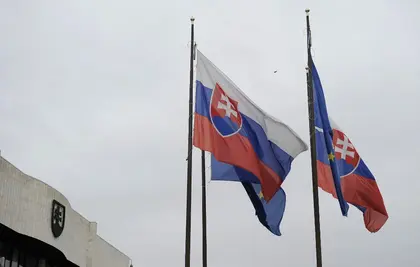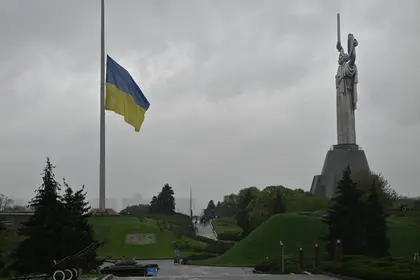While Vladimir Putin wages a vicious military war against Ukraine, he is also waging an energy war against Europe — deliberately restricting energy supplies, driving up energy costs to astronomical levels, and fueling price inflation generally. He hopes that by deliberately inflicting such pain on European publics, he can force European governments to urge Ukraine to give up territory and beg for peace.
Putin’s plan is not working. Ukraine will refuse to give up and, to their credit, European publics and governments have proven resolute in their opposition to Russia’s war and support for Ukraine. Indeed, in response to Russian pressure, Europe has decided to eliminate its dependence on Russian oil and gas and increase its military and economic support for Ukraine.
Despite such strong support, Europeans have overlooked one major opportunity in front of them. By looking at Ukraine as a weak country needing charity and assistance, they are missing the fact that investment in renewable energy in Ukraine can help Europe solve its ongoing energy crisis.
Russia’s continued and deliberate bombardment of Ukraine’s energy infrastructure has made repairing Ukraine’s energy grid an urgent requirement in any event. Ukraine needs an immediate “Winter Aid” package from the EU and US.
But resources dedicated to Ukraine’s energy sector should not only repair what has been damaged. They should help Ukraine further integrate its energy grid with the rest of the EU — something it is required to do as an EU candidate country anyway — and invest in forward-looking renewable energy, where Ukraine has favourable conditions and can help the EU reduce its own fossil-fuel dependence.
Consider the simultaneous challenges facing Europe in the energy sector: excessive dependence on Russian gas and oil, which has proven both a commercial and political vulnerability. Record-smashing high consumer prices for energy. The inability of several EU states to meet the EU’s own targets for renewable energy by 2030 and 2050. The need to support Ukraine’s macro-financial stability in wartime with billions of Euros, even as the EU copes with energy shortages and high inflation.
All of these challenges can be addressed through a market-based initiative that merits full EU support: support investment in Ukraine’s renewable energy sector and import green electricity back into the European Union. Ukrainian experts have already set a goal: 30 Gigawatts of renewable energy exported to Europe by 2030.
Unlike many Central European states, which have greater population density and unfavourable climate conditions, Ukraine has vast territory ripe for wind and solar power production. This was a burgeoning industry prior to Feb. 24, 2022 and should be so again as Ukraine re-takes its territory (especially in the south). Such investment can be incentivised on a private sector basis at low cost if G7 governments provide limited equity guarantees through a type of war-risk insurance.
Ukraine is already connected to the EU electrical grid, although these connections need reinforcement. Before Russia’s recent attacks beginning October 10, Ukraine was exporting excess electricity to the EU. Because of the fall in Ukrainian GDP caused by the war, Ukrainian demand had been well below its production capacity. By getting Ukrainian electricity production back on line in the short-term — and expanding it with new renewable energy investment in the medium-term — Ukrainian capacity can increase even more, making it a reliable source of supply for the EU.
Exporting renewable Ukrainian electricity to the EU will produce four main benefits. First, it will reduce prices for European consumers. Second, it will increase the renewable portion of EU states’ overall energy mix. Third, it provides resources for Ukraine on a sustainable, business basis (rather than through government hand-outs), increase tax revenue in Ukraine, provide needed balance of payments support, and diminish the scale of macro-financial support Ukraine requires from international donors. And finally, replace dependence on Russian energy with mutually beneficially energy trade with Ukraine.
The European Union’s decision to grant candidate status to Ukraine is a recognition that Ukraine is part of the European family, and that Ukraine can be an asset to the EU, rather than a liability. Ukraine is large country with world-class agriculture, a vibrant tech sector, mining, rare earth minerals, industry, well-educated human capital, and energy.
Investing now in Ukraine’s energy sector will accelerate Ukraine’s economic recovery, its adoption of EU standards, and position Ukraine even in wartime as a contributor to solving European challenges.
Support for such investment is a worthy action item for the G7, the various Ukraine recovery conferences taking place under G7 and UK auspices, and the Czech and (upcoming) Swedish EU Presidencies. Seldom does a policy produce a quadruple win at minimal cost to taxpayers — but this would be one of them.
AUTHOR BIO
Vazil Hudak is Vice Chair of GLOBSEC and a former Vice President of the European Investment Bank and Minister of Economy of the Slovak Republic.
Ambassador Kurt Volker is a Distinguished Fellow at the Center for European Policy Analysis. He served as US Special Representative for Ukraine Negotiations from 2017-2019 and as US Ambassador to NATO from 2008-2009.
Reprinted from Euobserver with the permission of the authors.
The views expressed are the authors’ and not necessarily those of the Kyiv Post.
You can also highlight the text and press Ctrl + Enter







Comments (0)